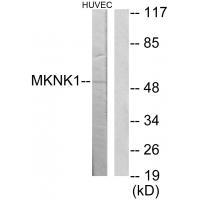
| WB | 1/500-1/3000 | Human,Mouse,Rat |
| IF | 咨询技术 | Human,Mouse,Rat |
| IHC | 咨询技术 | Human,Mouse,Rat |
| ICC | 技术咨询 | Human,Mouse,Rat |
| FCM | 咨询技术 | Human,Mouse,Rat |
| Elisa | 咨询技术 | Human,Mouse,Rat |
| Aliases | MAP kinase-interacting serine/threonine-protein kinase 1; EC 2.7.11.1; MAP kinase signal-integrating kinase 1; Mnk1; MKNK1 |
| Entrez GeneID | 8569; |
| WB Predicted band size | 51kDa |
| Host/Isotype | Rabbit IgG |
| Antibody Type | Primary antibody |
| Storage | Store at 4°C short term. Aliquot and store at -20°C long term. Avoid freeze/thaw cycles. |
| Species Reactivity | Human |
| Immunogen | Synthesized peptide derived from internal of human MKNK1. |
| Formulation | Purified antibody in PBS with 0.05% sodium azide. |
+ +
以下是关于MKNK1抗体的3篇参考文献及其简要摘要:
---
1. **文献名称**:*MNK1 signaling axis promotes tumorigenesis and metastasis in colorectal cancer*
**作者**:Ueda, T., Sasaki, M., Elia, A. J., et al.
**摘要**:该研究探讨了MKNK1(MNK1)在结直肠癌中的功能,通过抗体检测发现其在肿瘤组织中高表达,并证明其通过调控eIF4E磷酸化促进肿瘤生长和转移。抑制MKNK1可减少癌细胞侵袭性。
2. **文献名称**:*Targeting MNK1/2 in cancer: The role of phosphorylation‐dependent eIF4E signaling*
**作者**:Wheeler, M. C., & Rizzi, M.
**摘要**:文章系统分析了MKNK1/2激酶在癌症中的调控机制,利用特异性抗体进行蛋白互作研究,发现其通过磷酸化eIF4E驱动致癌mRNA的翻译,提出靶向MKNK1可能成为治疗策略。
3. **文献名称**:*MNK1 inhibitor combined with PD-1 blockade enhances antitumor immunity*
**作者**:Reich, S. H., Sprengeler, P. A., & Chiang, G. G.
**摘要**:研究开发了MKNK1小分子抑制剂,并通过抗体验证其抑制效果,证明联合免疫检查点阻断可增强抗肿瘤免疫反应,为癌症联合治疗提供新思路。
---
以上文献均涉及MKNK1抗体的应用,涵盖其在肿瘤机制、靶向治疗及免疫联合治疗中的研究。如需具体DOI或年份,可进一步补充检索。
The MKNK1 (MAP kinase-interacting serine/threonine kinase 1) antibody is a crucial tool for studying the role of MKNK1 in cellular signaling and disease contexts. MKNK1. also known as MNK1. is a serine/threonine kinase activated by the ERK and p38 MAP kinase pathways. It phosphorylates eukaryotic translation initiation factor 4E (eIF4E), linking extracellular signals to mRNA translation regulation. This kinase is implicated in cancer progression, inflammation, and resistance to therapies, making it a potential therapeutic target.
MKNK1 antibodies are widely used to detect protein expression, phosphorylation status, and subcellular localization in techniques like Western blotting, immunohistochemistry, and immunofluorescence. They help elucidate MKNK1's dual role in tumorigenesis—both promoting cell survival under stress and suppressing metastasis in certain contexts. Researchers also employ these antibodies to study crosstalk between oncogenic pathways (e.g., RAS-ERK) and translational control mechanisms.
Commercial MKNK1 antibodies are typically developed against specific epitopes, with monoclonal antibodies offering high specificity for distinguishing between MKNK1 isoforms (MKNK1a/b) and phosphorylated forms. Validation includes testing in knockout cell lines to confirm target specificity. Recent applications extend to neurodegenerative disease research, where MKNK1's interaction with TDP-43 aggregates is being explored.
×